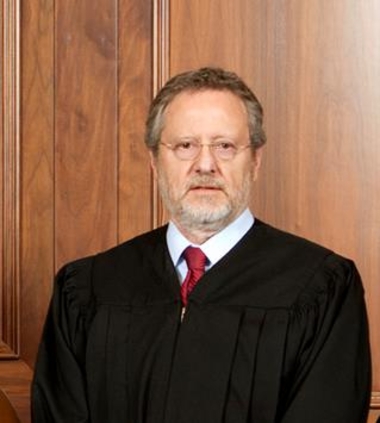Retiring Wyoming justice recalls Shepard case

Joan Barron, Casper Star-Tribune
Cheyenne, Wyo. (AP) — Fifteen years later, people still recall vividly the brutal death of gay University of Wyoming student Matthew Shepard following his attack by two young Laramie men.
They also recall the subsequent high profile trial of those two men — Aaron McKinney and Russell Henderson, who were convicted and are serving life sentences for Shepard's death.
Yet chances are that only a few people remember the name of the judge who presided over one of the trials.
And that's just fine with Barton Voigt.
The retiring Wyoming Supreme Court justice planned it that way.
Voigt was a district judge in Douglas when defense attorneys for McKinney exercised their right to have Albany County District Judge Jeffrey Donnell of Laramie was taken off the case.
The attorneys didn't say why they wanted Donnell bumped, nor were they required to do so.
Donnell asked Voigt to take the McKinney trial, which originally was a death penalty case. He agreed, and it consumed nearly a year of his life.
Voigt ruled on about 370 pretrial motions. Each one required a hearing and trips to from Douglas to Laramie for Voigt and his court reporter, Bob McKee.
The Shepard case came a few years after the circus-like televised trial of football star O. J. Simpson for the death of his ex-wife, Nicole Brown Simpson, and a restaurant waiter, Ronald Lyle Goldman.
Simpson was acquitted in a decision that roiled the country.
The judge in that trial was Lance Ito.
"I had just been horrified by the Simpson case," Voigt said in an interview with the Casper Star-Tribune "Everybody was just pathetic. What a stain on the justice system."
"I had a vivid picture in my mind of Judge Ito allowing things to go totally to hell and thinking to myself, 'I've got to prevent that from happening somehow.'"
Voigt had a simple policy up front that governed dealings with the news media; he would not talk to anyone.
Reporters had to go through his court reporter with their questions. Only those dealing with procedure, such as scheduling, for example, were answered.
"I didn't want to be Lance Ito. I didn't want to be on TV. I didn't want them quoting me," Voigt said.
Small-town judges in Wyoming aren't accustomed to the huge national following in a case like the Shepard case.
There was an onslaught of journalists, many with an agenda.
"We were surrounded by sound trucks and video cameras," he said.
"In not many cases do you look down from the courtroom during a break and see Peter, Paul and Mary walking across the lawn with their guitars," he said.
The trio was performing for UW homecoming and came to the court to show support for Matthew Shepard and his family.
In 2001, two years after the famous trial, Voigt was appointed to the Wyoming Supreme Court by former Gov. Jim Geringer.
Voigt started out to be a high school history teacher. A Thermopolis resident, he received bachelor's and master's degrees in history from the University of Wyoming, but also took some education courses.
He taught history at Riverton High School but found it unrewarding since 90 percent of the students wished they were somewhere else.
A friend told him about a job opening in the state Archives and Historical Department in Cheyenne. After two years in that job, he moved to the South Dakota Historical Department in Pierre, which has rich historical collections.
The first box he opened contained a letter from George Armstrong Custer to the father of a soldier who had been killed in a fight.
Then he learned that his persistent symptoms of a head cold were due to an allergy to dust and mold, a condition not conducive to work that includes rooting around in dusty boxes for historical treasures.
So he went to law school at UW and graduated in 1979.
He returned to his hometown of Thermopolis and practiced law there for a decade. He served as county attorney there, then moved to Gillette where he was a county judge and then county attorney.
The next career stop was his appointment in 1993 to the District Court in Douglas.
He stayed put until the Supreme Court appointment in 2001.
As a Supreme Court justice, he said the most significant cases are not the death penalty cases, but those dealing with school finance, and term limits — how government is constructed.
"Because you want to get those right," he said. "You don't want bad precedent coming out of those cases."
The scariest cases, he said, are those dealing with mineral valuation.
It may seem like a simple question to find the point of valuation but it's not.
"The mineral industry tells you if you put it at point X it will destroy the mineral industry in the state of Wyoming and you'll never see us again, we'll leave the state, and it will go broke."
"The state says that's a bunch of BS," Voigt added. If the court doesn't agree with its definition of the point of valuation, the state will lose millions of dollars in severance taxes.
The truth depends on statutory interpretation — where did the Legislature intend the point of valuation to be?
That's not simple, either, he said, because the statute usually is ambiguous.
Voigt is quitting five years ahead of the mandatory retirement age of 70 for state judges.
He's had two back surgeries and finds it difficult to sit through long court hearings. And that is what judges must do a lot of the time.
___
Copyright 2013 The Associated Press. All rights reserved. This material may not be published, broadcast, rewritten or redistributed.
The Gayly – December 10, 2013 @ 10:40am





